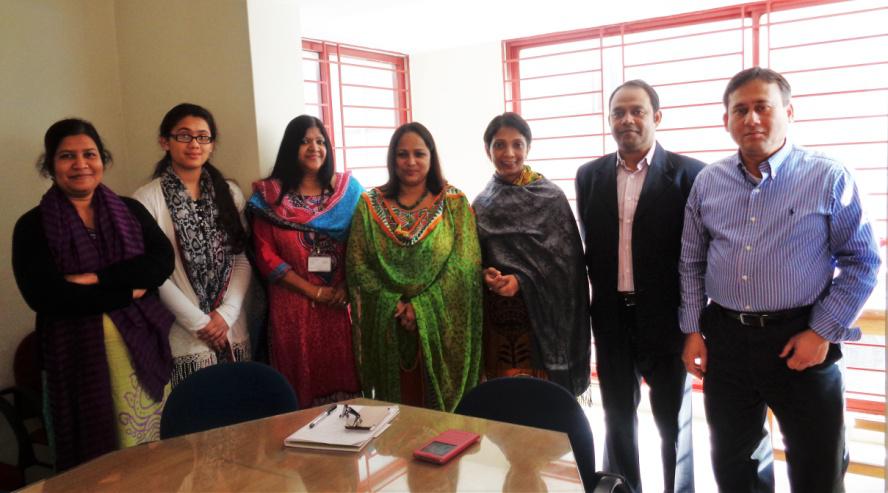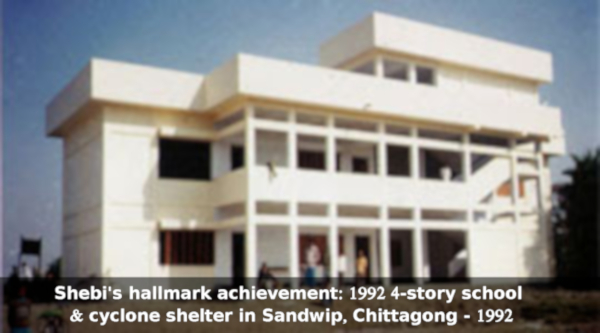Real-World Heroes in Bangladesh
By Sarah Alam
The true heroes in the world are those who work to better the lives of others, those whose selfless deeds often, unfortunately, go unnoticed, and those who are ardently committed to the pursuit of freedom. Not many perceive education as a form of freedom, but in a developing country, such as Bangladesh, education is the difference between poverty and self-improvement. While ignorance leaves people in shackles, education gives people the key to unlock their full potential. It gives us hope for a better future, awareness of the world around us, and the tools to make a meaningful difference. Those people courageous enough to make that difference are the true heroes. The educators that I met in Bangladesh are the epitome of true heroes.
On my trip to Bangladesh last winter, I had the pleasure of visiting different schools specializing in educating special-needs children, namely the Scholars Special School in Mohammadpur and the BRAC Nobodhara School Head Office in Nikiton. Since it was the end of the holiday season and school was not in session, I sadly did not get to see many students except for those who lived close to the school. However, I talked to various teachers and administrators and was amazed by their compassion and immense dedication to helping their students. They all expressed their dreams for their schools but lamented their practical limitations in fulfilling those goals.
Background
There are over 158 million people in Bangladesh1, making it one of the most densely populated nations in the world. It is estimated that 2.6 million children in Bangladesh have some type of disability or impairment, such as autism, deafness, and blindness. Although some progress has been made in the area of special-needs education and support for disabled people, there is still a long way to go. Laws and governmental regulations are nothing without support and enforcement as well as a more educated and aware public. There remains much ignorance around disabilities and Autism Spectrum Disorder (ASD) in Bangladesh, which prevents people suffering from such challenges from getting the assistance they need. The increasing rate of ASD worldwide underscores the need for greater support and awareness of the condition and the obstacles facing those who have it.
Visiting the Nikiton Head Office of the BRAC Nobodhara School

While talking to teachers in the Nikiton head office of the Nobodhara School, I listened to them explain that there remains a societal stigma around special-needs children. This prevents many parents, especially those in rural areas, from seeking help for their children, in fear of social consequences and humiliation. This way of thinking promotes a culture of ignorance about disabilities and prevents parents from fully understanding the condition of their child and how to best facilitate them. Also, many educators require more information on not only the best methods for creating an accessible learning environment for special-needs children, but also on the disability itself and how it impairs students themselves both mentally and physically. SHEBI had conducted a series of teaching seminars on ASD to educators in Bangladesh, and many teachers who had partaken in them noted how helpful they were. They expressed enthusiasm for more programs similar to that, saying that such discussions are essential for better understanding Autism and other disabilities. One teacher wisely noted, "Knowing more about what difficulties the students face as a result of their disability is most helpful in creating a productive learning environment for them."
Talking to Joya Hassan

Meeting briefly with Joya Hassan, who is the SHEBI Coordinator for Bangladesh, gave me a similar impression, in that there remains a lot to be done in order to make education accessible for disabled people and to help families deal with disabilities. Since Joya was headed to a United Nations conference on Disabled Persons in India, she was only able to meet with me for two hours. However, talking with her and understanding her insight on the situation of disabled people in Bangladesh was invaluable. She talked to me about her son, who has Autism, and her struggles with raising him and finding the right educational environment for him. She astutely pointed out, "More than laws, what is most needed is an emotional connection to the problems disabled people face in society. That is when real progress will be made." What Joya was referring to is the Persons with Disabilities Rights and Protection Act in Bangladesh, which was enacted by the Bangladesh Parliament in 2013. The types of disabilities mentioned in this Act include: ASD, physical disabilities, psychosocial disorders, visual impairment, speech disabilities, intellectual disabilities, hearing impairment, cerebral palsy, and Down syndrome2. While this law does protect rights to education, training, proper health service, accessibility in community and in modes of transportation, and discrimination-free employment opportunities2, it is nothing if not properly enforced and understood. It is important to increase common knowledge of disabilities and provide educators with more training on how to best help children with disabilities and understand what they go through.
Visiting Scholars Special School

Visiting the Scholars Special School for Special Needs Children in Mohammadpur was the most different experience during my time in Bangladesh because of my interaction with several students and teachers, as school was in session. Even though only a few students were able to come, due to hartals (mass protests and strikes), seeing and interacting with the students in their classroom setting was an amazing experience. First, I talked with Manju Banerjee, the longtime Headmaster and President of the school, who has come to the school every day it has been in session since its very start. She explained how since most of the students at Scholars Special come from middle class families, it receives very little government support compared to other larger schools with wealthier families. For instance, since teachers’ salaries are not covered by the government, they must be paid by the school. Although the teachers are kind enough to accept little pay, they also must support themselves and their family. As a result, Scholars Special has a very tight budget and is in need of more classroom materials, teaching aids, and toys/games for children to play with. They also expressed interest in partaking in seminars to learn more about Autism and other disabilities, as SHEBI had provided in the past. In addition to teaching, the school provides counseling at school and occasional home visits if needed. They also focus on vocational training to provide students with the tools to become financially independent. Thus, the school not only helps to educate students but also help them develop skills to use in the work force.
After talking to the teachers and Mrs. Banerjee, I was led upstairs to where most of the classrooms were. The teachers explained that every morning the students are led in some type of exercise to start the day. Other activities include singing, art, block printing, sewing, making wax candles, painting and designing earthen pots, cooking, and baking. Many female students also partake in traditional dance classes. To my surprise and delight, one female student presented a beautiful dance for us to the tune of a traditional Bengali song. She seemed incredibly happy while dancing, as if she was filled with pure joy. After the dance was over, she took a bow and the whole room erupted into claps. She looked around at all of us, and covered her face with her hands, tears of happiness streaming down her face. I walked up to her, and personally told her how much I loved the dance. She looked into my eyes and gave me a hug. As I hugged her back, my eyes teared up thinking of how simple these children’s wishes were. They cherish everything they have and content themselves with it. Her happiness inspired me to want to be able to give them more and see them even happier.
Then, the teachers gave us a tour of the classrooms and small playroom. One boy asked me what my name was, and in Bangla I replied, "My name is Sarah, what is yours?". "Rahim!" he exclaimed. He showed me a piece of artwork that he made and before I even had a chance to remark on how beautiful it was, he asked me what my name was again. Confused, I replied again, "My name is Sarah". A teacher explained to me that repeating words and phrases was one of the symptoms of Autism. Every few minutes Rahim would again ask me my name and patiently I would reply "Sarah" every time. As I walked around the classrooms, I thought of the schools of my childhood. The relative excesses of schools in the USA saddened me, since the students here deserve just as much, if not more. In the USA, schools have playgrounds and games in every classroom, many of which are thrown away after a few years of use. Instead of throwing such materials away, it would be more beneficial to send them to schools in need, such as Scholars Special. SHEBI has engaged in such programs and sends materials to various schools in Bangladesh, but needs the help of more schools to donate. Seeing the dedication of the teachers at Scholars Special and talking to the students is a memory I will truly cherish.
A Reflection
Visiting all of these people who care so deeply about helping underprivileged students and their families inspired me to do as much as I can to help them. Their selflessness and determination to help, despite all of their limitations, awed me. Although education is readily accessible in the USA, it is regarded as a luxury for those not part of the wealthy class in Bangladesh. While we moan every time we hear the alarm for school in the morning, there are tens of students who wish they would be given the same opportunities we have been so lucky to have. The problems that students in Bangladesh face are unimaginable to me, coming from a country where the government actively works to make education accessible, affordable, and inclusive. Although the Bangladeshi government has made laws regarding education for the disabled, much more must be done not only by the government, but also by the people of Bangladesh in order to make inclusive education for everyone a reality. Real change will come when everyone is aware of the issues at hand and works together to resolve them. By supporting and following in the footsteps of these real-world heroes, we can truly make a difference.
1. "Data Bank: Total Population." The World Bank: Data Bank. The World Bank, n.d. Web. <http://data.worldbank.org/indicator/SP.POP.TOTL>.
2. "Persons with Disabilities Rights and Protection Act in Bangladesh User-Friendly Booklet." APCD Foundation. APCD; WDDF; Southern Disability Forum, 2013. Web. <http://apcdfoundation.org/?q=content/persons-disabilities-rights-and-protection-act-bangladesh-user-friendly-booklet>.



